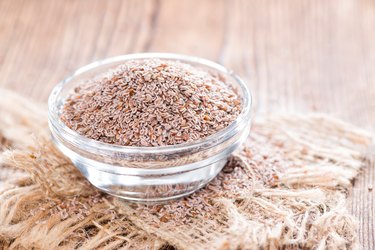
Metamucil is a brand name for a psyllium fiber supplement. Like other psyllium fiber supplements, Metamucil has some health benefits. However, taking too much Metamucil could cause negative side effects.
Tip
Adding Metamucil to your diet is a good way to meet your fiber goals. It's important to use it correctly, though, because you can have some side effects from taking too much Metamucil.
Video of the Day
Benefits of Using Metamucil
Psyllium is a water-soluble fiber mainly used as a bulk laxative to relieve occasional constipation or irregularity. It works by absorbing liquid in the intestines, which softens and adds bulk to stools. Psyllium fiber supplements are also effective at relieving mild-to-moderate diarrhea.
Video of the Day
Other potential Metamucil benefits include a reduction in cholesterol (especially when combined with a cholesterol-lowering diet), improved blood sugar, and possibly even weight loss because it helps to keep you full for longer. Any gel-forming fiber that's psyllium based should provide these same health benefits.
A review on the benefits of fiber therapy published in the April 2017 issue of the Journal of the American Association of Nurse Practitioners found that those who take a psyllium fiber supplement for six months saw sustained weight loss, as well as lower cholesterol and blood sugar levels.
Read more: 19 High-Fiber Foods —Some May Surprise You!
Side Effects of Psyllium FIber
Some people experience gas, abdominal pain, nausea, diarrhea or constipation when taking psyllium fiber supplements, according to MedlinePlus. The supplement also may cause headaches, coughing, runny nose, and sinus problems. To prevent side effects, start with a low dose and gradually increase it if necessary. It's also important when taking any fiber supplement, to increase your fluids, and drink plenty of water each day.
Taking Too Much Metamucil
While it's unlikely that you would overdose on Metamucil, you should follow the recommended dosages for the various Metamucil products, which are listed on the product label and on the product website. Taking too much Metamucil can cause Metamucil overdose symptoms which can include abdominal pain, nausea, vomiting or other symptoms of an overly high fiber diet. In addition, some Metamucil products contain potassium, which should not be taken in high doses. Keep the product out of the reach of children.
According to the MedlinePlus, Metamucil, or any psyllium fiber product should be safe for most people to take, as long as you follow the recommended dose on the label. In addition to potential GI symptoms if you take large amounts, you may also run the risk of interaction with some medications or iron supplements.
If you take Tegretol or lithium, as well as medications for diabetes, high blood pressure, blood thinners, ask your doctor about any potential interaction with Metamucil.
Read more: Easy Food Substitutes for Psyllium
Metamucil and Your Fiber Goal
Because of Metamucil's health benefits, it can be taken every day as part of a healthy diet that includes other sources of fiber. The recommendation for fiber is about 25 grams per day for women and about 38 grams per day for men. Most people don't eat enough, so adding a fiber supplement can help to fill in this fiber gap.
A March 2015 article in Nutrition Today describes the benefits of meeting that daily fiber goal, but the author also cautions that it's important to obtain a variety of types of fiber, most of which should come from food.
How to Take Metamucil
Take Metamucil with at least 8 ounces of water or another liquid. If the powder is too thick and causes difficulty swallowing, add extra liquid to thin the mixture. Do not take more than recommended on the label or prescribed by your doctor. Psyllium can inhibit the absorption of some medications, so take medication at least two hours before or after taking Metamucil.
- MedlinePlus: "Blond Psyllium"
- Metamucil: "Metamucil Fiber Products"
- Journal of the American Association of Nurse Practitioners: "Fiber Supplements and Clinically Proven Health Benefits: How to Recognize and Recommend an Effective Fiber Therapy"
- Nutrition Today: "Evidence-Based Approach to Fiber Supplements and Clinically Meaningful Health Benefits, Part 2"
- Metamucil: "Metamucil Sugar Free Orange Smooth Powder Directions"